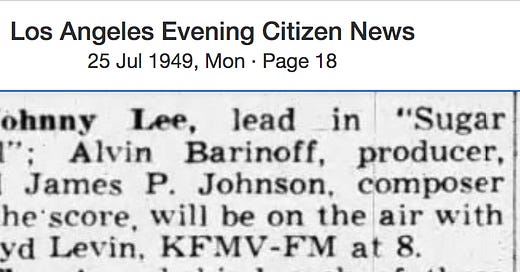One of my all-time favorite musicians is James P. (for Price) Johnson (1894-1955), the so-called “Father of Stride Piano,” and the composer of many songs and some longer instrumental works. But not everyone “gets” him. Most people are much more familiar with his protégé “Fats” Waller, who was indeed a wonderful pianist, and had the advantage of also being a singer, songwriter, and a very witty comedian. Others prefer Willie “The Lion” Smith (he was listed that way in the Manhattan phone book!) who, in addition to being a fine pianist and composer, was an entertaining storyteller. And there were many others in the “stride” idiom, of course, including Duke Ellington when he was young. (It was called “stride” because of the movements of the left arm.) Yet, all of these pianists, Duke included, looked up to James P., and for good reasons.
We will explore James P’s music in several posts. For today, let me share with you a previously unknown performance, recorded by the late Floyd Levin at the house that Johnson and his wife were renting in Los Angeles in the summer of 1949. Johnson was there to work with his friend, noted actor and lyricist Flournoy Miller, on a revival and revision of their musical Sugar Hill. (Miller and his partner Aubrey Lyles had been instrumental in the famous show Shuffle Along, as well as the first version of Sugar Hill in 1931, but Lyles had died in 1932.) Three other piano solos from the same day have been released, but they are very hard to find. I’ll be sharing them next time, with quite a bit of background information about the show.
Levin was a radio host and journalist who specialized in early jazz. Some of his writings were collected in a book. In that book he explains how he got to know James P. during his stay in L.A., as we’ll discuss next time. This recording was probably made in July, 1949. Levin said it was from August, but he also said that he recorded these piano solos while he was interviewing James for his radio show. James was on the show (pre-recorded) on July 25 at 8pm, so this had to be from before that. Here is the newspaper announcement of the radio show:
On the recording, you will hear James P. talking at the beginning. (For those of you who have heard Duke Ellington’s voice, Johnson’s is somewhat similar.) There is a woman’s voice as well—Levin said his wife Lucille was often present. James says that he wants to reminisce, and to play some things that he hasn’t played “on a job”—that is, in public—in 25 or 30 years. Levin asks James to identify himself for the recording, which he does. Then, just before starting, Johnson says “Incidentally, this is what I was playing when I first met my wife.” (Thank you to subscriber Russell Fine for deciphering this.) That would make this a very old piece, because Johnson had met his long-time wife, singer Lillie Mae Wright, back around 1914!
After a four-bar introduction, James starts in at 0:36 jamming on the chord progression of his famous signature piece, “Carolina Shout.” This is in Ab, not the usual key of G. (I checked the recording speed, and Ab appears to be correct). He speeds up just a bit at 1:03 and then stays at the new tempo. At 1:12 he goes into a second theme in Ab, followed at 1:28 by more variations on “Carolina.” Tnen at 1:45 we hear a distinctly new theme in Db. (It was usual in ragtime pieces, and, before that, in marches, to have a second theme in the subdominant key, a fourth above the tonic—think, for example, of the second theme in “Maple Leaf Rag.”) It sounds a little familiar but I can’t place it at the moment. (Also there is a very brief wobble in the original recording, right around 2:00.) Finally, at 2:17 he returns to the chords of “Carolina Shout,” but now in Db.
At the end Levin asks the name of that tune, and you will hear James say “That’s just a rag, that’s what I’m playing.” (I think that’s what he says.) Levin wrote, “I never knew if that was the title or a description.” To me it’s clear that “just a rag” was a description, not a formal title. Discographers might list it as “Just A Rag,” but unless we learn that it actually has a title, I’d suggest that “Untitled” or “Untitled Rag” might be better.
By any name, it’s great music. And there’s much more to come.
All the best,
Lewis
P.S. Special thanks to jazz historian Steven Lasker and singer-pianist Michael Feinstein for assistance with this post.




Great post, Lewis!
"incidentally this is what I was playing when I first met my wife" I think...